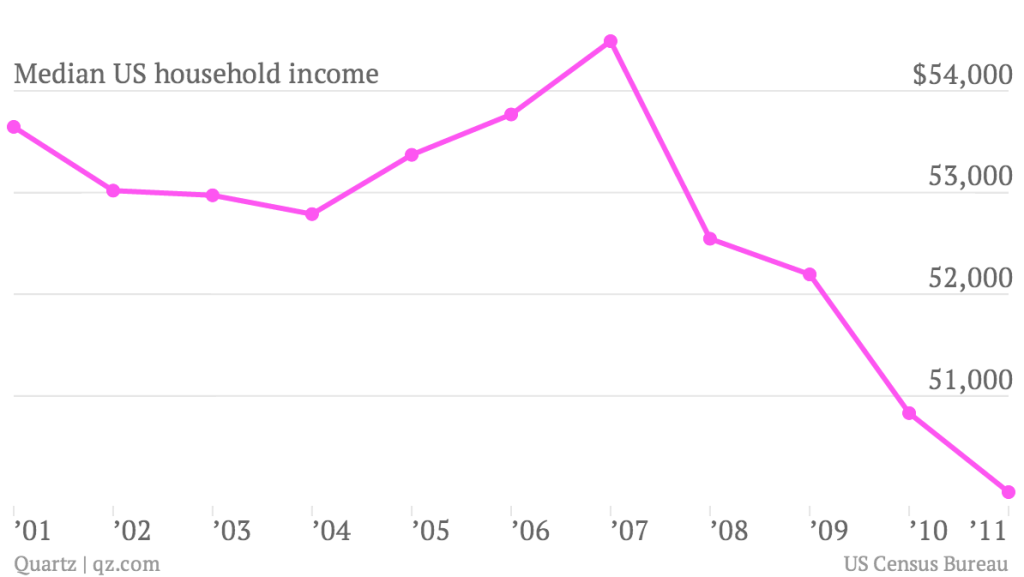The income inequality gap is growing especially among western nations. There are titanic societal forces at work that are creating a future that has problems that appear to be currently unsolvable. It is a dilemma that permeates all segments of society and goes to the root of how it is economically structured. The changes seem intractable and the future largely uncertain.
The above videos detail this problem very well, however both present neither cause or solutions.
“Companies that sell discount goods to low-income buyers struggling with lean employment prospects, such as Walmart and Family Dollar, are racking up enormous sales, sending their stock prices higher as they enjoy success from distress.
Companies that sell luxury goods to the highest income households, such as the handbag maker Coach and the jeweler Tiffany & Co., also basking in lucrative times, reflecting how the wealthiest Americans are prospering with little thought of economic troubles.
But companies whose profits lean heavily on middle-income earners, like J.C. Penney and Sears, are stagnating, much like the American middle class itself…..
…As Christopher portrayed it, that has produced a “bifurcation” of the stock market, with companies harvesting profits by targeting customers at either end of the income spectrum. “Those companies that stick to the middle tier just suffer,” he said.” (source)
Median Income in perpetual state of decline:
(source)
Income for the vast majority of people has been on a steady decline with no sign of stopping. Declining income is the chief reason for the wealth inequality gap. U6 unemployment in the US is above 14% which puts added downward pressure on wages.
However one of the main reasons I believe for income decline is global population explosion and globalization. Basically there are too many people on the planet given the jobs available. With the advent of multinational corporations, outsourcing and cheap/easy shipping the labor pools across the developed nations have provided incredibly cheap labor putting immense downward pressure on wages globally. In order to maintain their standard of living westerners have gorged themselves on massive amount of debt giving the illusion of a prosperous modern society.
As Bill Gross of PIMCO points out….Capitalism depends on investment, which depends on consumption, which depends on attractive wages. Without real wage growth, profits grow but real economy can’t.
The causes for wealth inequality?
It is really easy for people to pull up stats of how unequal things are however what is more difficult and more important to understand is what the cause of this inequality is. Briefly I believe the primary root drivers of wealth inequality are the following:
- Population Growth
- Absolute rise
- Globalization
- Productivity
- Robotics
- Computers
- Monopolies
Productivity
In their book, Brynjolfsson and McAfee cite a meeting between Henry Ford and Walter Reuther, the union leader. Pointing at his new robots, Mr Ford says, “How will you get union dues from them?” Mr Reuther replied: “How will you get them to buy your cars?”
In some ways our technology has become too good. While productive technology offers incredible advantages it also replaces the need for humans to work. Then the owners of the technology make most of the profit, while workers get laid off en mass.
http://nextbigfuture.com/2013/05/international-workers-that-are-300.html
http://nextbigfuture.com/2013/04/the-new-machine-will-deliver-even-more.html
http://www.amazon.com/The-Lights-Tunnel-Automation-Accelerating/dp/1448659817/ref=cm_cr_dp_asin_lnk
Possible partial solutions:
Progressive tax on large incomes of companies. This would promote companies to split up, or maintain a smaller size encouraging health competition. (source)
“If one machine can cut necessary human labor by half, why make half of the workforce redundant, rather than employing the same number for half the time? Why not take advantage of automation to reduce the average working week from 40 hours to 30, and then to 20, and then to ten, with each diminishing block of labor time counting as a full time job? This would be possible if the gains from automation were not mostly seized by the rich and powerful, but were distributed fairly instead.” (source)
What is the End-Game?
I currently see this game ending in two possible ways. One positive and one negative.
The negative scenario is an one where a small segment of society the 1% or less own 99% of societies wealth. In effect this would be no different than the feudal era or how humans have lived in civilizations for most of human history. 99% of people are extremely poor and 1% of people are extremely rich. The difference would be the extremely poor wouldn’t be dying of starvation or anything like that working extreme labour conditions, but they would be living unemployed off food stamps in heavily gov’t subsidized apartment projects. Those who can eek out a meager income in the service sector would live in homes supporting numerous other family and friends. It would a modern kind of ghetto where all the basic necessities of life would be provided.

